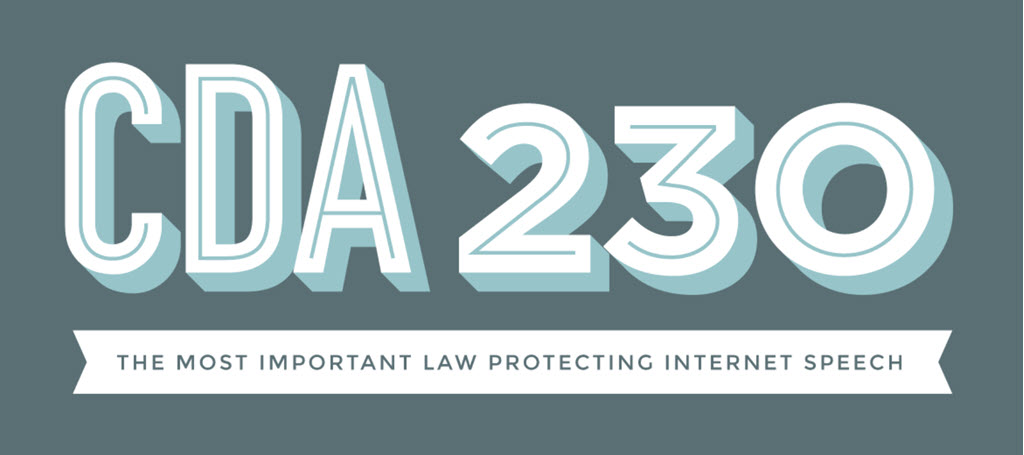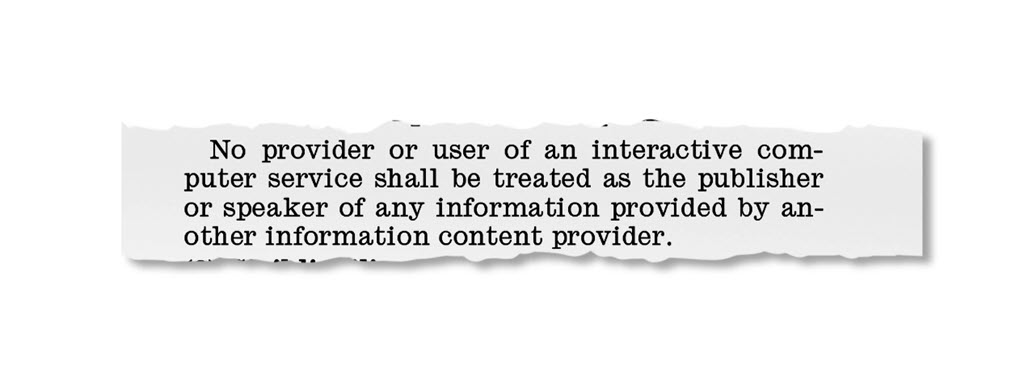
Settle down, this is important.
We’re going to talk about Section 230.
I understand that you have no idea what that is. For now, take my word for it. I wouldn’t put you through this if it wasn’t a big deal.
Section 230 is the key to understanding Facebook and Twitter. And the Internet. And our society and our politics.
Here’s an example: Republicans contend that Facebook and Twitter are censoring their conspiracy theories. It’s not true, but set that aside for now: Section 230 is the law that says Facebook and Twitter have legal permission to censor whatever they want, regardless of whether the posts are true or completely bugfuck insane. President Trump signed an ineffective and stupid executive order in May declaring that Section 230 protections are icky. The Senate Judiciary Committee hauled Mark Zuckerberg (Facebook) and Jack Dorsey (Twitter) to another hearing a couple of days ago to complain about censorship and ask more dumb questions about Section 230.
Another example: A bipartisan report by the House Judiciary Committee last month concluded that antitrust action is appropriate against Facebook, Google, Amazon, and Apple. Two weeks later, the Department of Justice filed an antitrust lawsuit against Google. Section 230 is an important part of the policy framework for evaluating antitrust actions against the tech companies.
In a sense, Section 230 is one of the important reasons that the stock market appeared to go up this year. It turns out the stock market actually went down for most of 2020 for 494 of the 500 companies in the S&P 500. The six giant tech companies did so spectacularly well that the index as a whole reached record heights.
Section 230 is at the heart of all of it.
Sometimes it seems like everyone wants to reform or repeal Section 230, frequently for contradictory reasons, and usually based on a misunderstanding of what it is and what the effects would be of changing it. Now that I’ve mentioned it, you’ll see in the news all the time.
It’s time for you to come up to speed.
What is Section 230?

Section 230 is a federal law, part of the Communications Decency Act of 1996.
It’s just twenty-six words.
No provider or user of an interactive computer service shall be treated as the publisher or speaker of any information provided by another information content provider.
Section 230 says that Facebook and Twitter can’t be sued if someone posts awful things. When you are the victim of a post that is obscene, libelous, or just hateful, you can sue the person who posts the terrible stuff but you can’t sue Facebook or Twitter.
Section 230 also says that Facebook and Twitter can’t be sued if they remove posts. It’s up to them to decide how closely to examine what’s posted. They can moderate the content that’s posted, or not; they get to decide what to take down or leave up.
Obviously it’s not just Facebook and Twitter that get Section 230 protection. It covers product reviews on Amazon, restaurant reviews on Yelp, the mad rantings on Reddit, and comments on articles and blog posts.
Sounds pretty simple, doesn’t it? Yet it’s magical. There are some good reasons that Jeff Kosseff wrote a book about Section 230 last year and titled it The Twenty-Six Words That Created The Internet.
Why was Section 230 written?
Funny legal story.
In 1995, Prodigy was the largest online service, kind of the Facebook of its day. People could post things on Prodigy; the service did a bit of moderation but mostly left posts alone.
Stratton Overmont sued Prodigy for defamation because someone wrote on a Prodigy message board that the firm had committed fraud. Does the name sound familiar? It’s the firm founded by stockbroker Jordan Belfort, the character played by Leonardo DiCaprio in Wolf of Wall Street.
A state court judge ruled against Prodigy, even though it was obvious that no one at Prodigy had any idea what had been posted – even back then there was too much being posted too fast for any human beings to review it all.
Keep in mind that the court would have ruled in favor of Prodigy if it hadn’t done any moderation at all. The judge thought Prodigy was responsible because it had done some moderating but it missed the defamatory post; the legal thinking was that once you start looking for needles, you own the entire haystack. We’ll come back to that thought later.
A couple of congressmen thought that was the wrong result. They wrote Section 230 to encourage online services to moderate things like pornography, dirty jokes, violent stories, and material harmful to children, without being worried that the services would be sued for material that slipped through.
The congressmen also thought a legal shield would encourage the growth of an entire industry built on helping people communicate online. They were right.
Section 230 was quietly added to a much bigger and more controversial law, the Communications Decency Act. Not long after that, almost everything in the Communications Decency Act was declared unconstitutional – all but the innocuous-looking Section 230.
The Internet has been built on that tiny fragment of a law.
What was the effect of Section 230?
The Internet was a tiny thing in 1996. Almost no one had Internet access. Companies were just beginning to set up websites; few of them knew quite what the purpose of a website was, exactly. The name Google.com was registered in 1996. (So was Bruceb.com!) The iPhone was more than ten years away.
Section 230 made it safe for companies to build businesses based on content provided by users. It provided an assurance of legal safety that was directly responsible for the growth of almost all of the major web services. Think of the companies that are built directly on content from you and me:
- Zoom
- YouTube
- TikTok
- Wikipedia
- eBay
- Yelp
None of those companies would have been created without Section 230.
Google’s search results rely on content from third parties. We started shopping at Amazon because of the product reviews submitted by users. Amazon would look nothing like it does today if it could have been sued for one-star reviews! Zoom flourishes because it is not responsible for Jeffrey Toobin’s penis or the other things that people get up to in Zoom meetings.
As Professor Kosseff puts it:
“Section 230 created the legal and social framework for the Internet we know today: the Internet that relies on content created not only by large companies, but by users. The multibillion-dollar social media industry. Hateful comments beneath new stories. The power of a consumer to tell the world about a company’s scams and ripoffs. The unfounded claims by anonymous cowards that can ruin an individual’s reputation. The ability of the victims of those allegations to respond freely. Without Section 230, companies could be sued for their users’ blog posts, social media ramblings, or homemade online videos.”
In many ways, Section 230 is just a specific way to carry out the First Amendment guarantee of freedom of speech. Websites have First Amendment protection for their decisions about what to post, fact-check, or remove, just as newspapers and broadcasters edit their content.
Section 230 provides peace of mind and an easy way for courts to reach the right decision about First Amendment cases. That’s important! It’s crucial for small companies trying to find ways to compete against the giant tech companies and who don’t have deep pockets for legal fees to fight lawsuits.
There are costs to freedom of speech. It is very unsatisfying to tell a victim of online attacks that she has no remedy because freedom. We’ll talk later about the multitude of forces looking to chip away at Section 230 protection.
The tech industry grew and thrived because of Section 230 protection. Today the costs of freedom of speech are mounting, as bad actors use those same websites to harass innocent victims, organize terrorist plots, traffic children for sex, and damage American democracy. Facebook and Twitter are voluntarily starting to moderate content more aggressively. That is exactly what Section 230 was drafted to encourage.
Section 230 provides more protection for online third-party speech than any law in any other country in the world.
The Internet was built on Section 230.
Changing or eliminating Section 230 would fundamentally unravel the Internet.
In the next article, we’ll look at the reasons that Section 230 is in the news today. Who wants to modify or end Section 230 protection? What would be the effect of removing Section 230?

